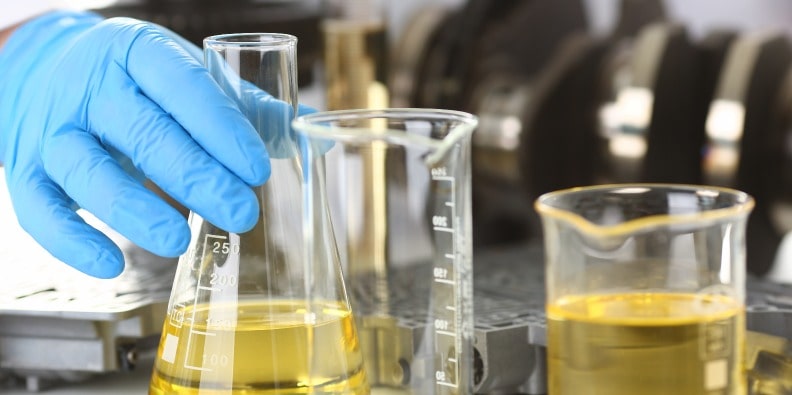Diesel Exhaust Fluid (AdBlue) Testing

AdBlue Analysis: TS ISO 22241 Compliance and Quality
AdBlue is a fluid used in modern diesel engine vehicles, aimed at reducing emissions. This fluid reduces nitrogen oxide (NOx) emissions by improving the efficiency of selective catalytic reduction (SCR) systems in vehicles. However, the desired quality of AdBlue is crucial for both vehicle performance and environmentally friendly emission management. In this blog post, we will discuss how AdBlue analysis is performed and the role of TS ISO 22241-1 and TS ISO 22241-2 standards in this process.
What is AdBlue and Why is it Used?
AdBlue is a colorless and odorless liquid composed of 32.5% high purity urea and 67.5% demineralized water. Used in diesel engines, this additive works with the SCR system to convert harmful nitrogen oxide compounds in exhaust gases into harmless nitrogen and water vapor. If AdBlue is of poor quality, the SCR system may be damaged, engine performance may decrease and the desired emission values cannot be achieved. Therefore, certain quality standards must be observed in the production and analysis of AdBlue.
Benefits of AdBlue Analysis
AdBlue analysis offers many advantages for both vehicle owners and the environment:
- Engine Protection: Good quality AdBlue ensures long life and efficient operation of the SCR system. This prevents engine failures.
- Low Emissions: The use of quality AdBlue effectively reduces NOx emissions, protecting the environment and complying with emission regulations.
- Fuel Efficiency: Using AdBlue in the right proportions ensures more efficient fuel combustion and improves vehicle performance.
- Reduced Maintenance Costs: Quality AdBlue reduces wear on engine parts, protects the SCR system and thus reduces maintenance costs.
How to Maintain AdBlue Quality
In addition to quality control of AdBlue, it is also important to pay attention to storage and transportation conditions. AdBlue should be protected from extreme temperatures and stored in a clean and dry environment. In particular, it should not be stored in metal containers, glass, plastic or stainless steel containers should be preferred. In addition, sealed lids should be used to prevent AdBlue from coming into contact with other substances during storage.
TS ISO 22241 Standards: Quality Criteria for AdBlue
AdBlue analysis is based on two main standards:
- TS ISO 22241-1:2019: specifies the specifications and minimum quality requirements for AdBlue as a high purity urea solution for diesel engines. It allows control of the urea concentration, impurity level and chemical properties of AdBlue.
- TS ISO 22241-2:2019: Defines the methods of analysis of AdBlue. This standard specifies methods for testing various properties of AdBlue and ensures the accuracy of the analysis.
Tests and Methods for AdBlue Analysis
A number of analysis methods are applied to assess the quality of AdBlue. Here are these analyzes and some of the main parameters for quality control according to TS ISO 22241-1 and 22241-2 standards:
|
Matrices
|
Test Name
|
Method
|
Principle
|
|
Aus32
|
View
|
TS ISO 22241-1
|
Visual check of clarity and colorlessness of the solution
|
|
Aus32
|
Urea Content (%)
|
TS ISO 22241-1 / 22241-2
|
Titrimetric analysis
|
|
Aus32
|
Alkali metalizer (Na+ ve K+)
|
TS ISO 22241-1 / 22241-2
|
Analysis by ion chromatography
|
|
Aus32
|
Heavy Metals (Fe, Cu, Zn, vb.)
|
TS ISO 22241-1 / 22241-2
|
Analysis by ICP-MS
|
|
Aus32
|
Biurea Content (%)
|
TS ISO 22241-1 / 22241-2
|
Analysis by titrimetric or spectrophotometric method
|
|
Aus32
|
Aldehyde Content
|
TS ISO 22241-1 / 22241-2
|
Analysis by gas chromatography
|
|
Aus32
|
Phosphate, Cyanate and Other Ionic Impurities
|
TS ISO 22241-1 / 22241-2
|
Analysis by ion chromatography
|
|
Aus32
|
Density (at 20°C)
|
TS ISO 22241-1 / 22241-2
|
Measurement with pycnometer or digital densimeter
|
|
Aus32
|
Refractive Index
|
TS ISO 22241-1 / 22241-2
|
Measurement with refractometer
|
|
Aus32
|
pH
|
TS ISO 22241-1 / 22241-2
|
Measurement with pH meter
|
|
Aus32
|
Conductivity
|
TS ISO 22241-1 / 22241-2
|
Electrical conductivity measurement
|
NANOLAB Adblue Analysis
NANOLAB always offers you the most reliable and fastest solution with its experience and strong infrastructure in AdBlue analysis. Thanks to ISO 17025 accreditation, you get internationally recognized test and analysis results for quality control and compliance of AdBlue. Furthermore, with our extensive instrumentation and expert technical team, we accurately analyze the components of AdBlue, provide results that comply with all quality standards and respond quickly and efficiently. And thanks to our regulatory expertise, we fulfill the legal requirements regarding AdBlue in the most accurate way, making your products compliant with international standards. Nanolab, the address where quality and speed combine in AdBlue analysis!

